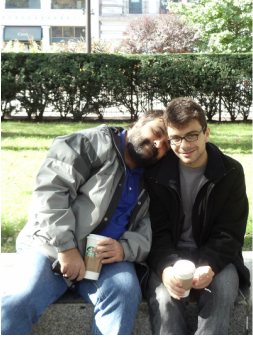

When I was four years old, I discovered a taste for telling stories to an empty room. Back then, when we still lived in Bucharest, in the Drumul Taberei district, all I needed was a bit of open space, somewhere where no one could see me, where I could run endlessly in circles and leave behind little mists of spit –my lips trying tirelessly to mimic the sound of spinning helicopter blades and airplane propellers. For some reason, my stories could only be told in this way, because only in this way could they materialize, like films, inside my mind. Plotlines, characters, and intricate action scenes were always clearest to me as I jumped over toys and furniture, or as I dove, head-first, into a couch –enacting some catastrophic explosion that marked the climax of an epic melodrama. Three years later, when we moved to Minnesota, I learned to tell my stories in English (or at least what I felt sounded like English). Suddenly, they seemed more important when told in this other language. I almost felt responsible for them. I felt the need to improve them, to make them better and this brought along a new kind of pleasure, one I hadn’t experienced before. “Boy,” I’d say, pausing in the middle of a big scene to catch my breath, “I could totally do this for the rest of my life.”
It’s still embarrassing to say, but it wasn’t until turning sixteen that I finally stopped telling stories in this way. I was more or less shamed into quitting by my parents. “You’re too old to still prance about the house like that,” they’d said and I hung my head low, my face flushed red like a radish, realizing they were probably right. So I stopped. It was now time to be serious, I thought, to be a grown up. When I went to college, I told myself I’d study only something very serious, something very hard, and so settled on Mathematics. I trudged through as best I could. I worked hard –I can’t say I wasn’t serious– but there were still many nights when I put off doing a problem set to read a book instead, watch a film (maybe two), or sketch a few scenes and characters.
The day I submitted my application for an MFA (Masters of Fine Arts) in Creative Writing at Cornell University I was working as a business analyst in Chicago, a job I didn’t particularly enjoy. Of course, I never thought I’d be accepted into this extremely selective program. Only four people are extended an offer each year, four lucky people out of hundreds of applicants. “It’s just like any other lottery,” I thought, “I might as well give it a try.” So when I woke up one Saturday to the sound of my phone buzzing eagerly atop the nightstand –that long awaited call letting me know I’d made it in– you can bet I was beside myself with joy. I stayed up three whole nights afterwards, without a wink of sleep (I’m not exaggerating) imagining all the things I would write about, all the things I wanted to say.
It’s an absolute privilege to be at Cornell University now, in my first year. I’m surrounded by a wonderful community of writers, who feel the same way I do about crafting their stories and poems. The place is also steeped in a fantastic literary tradition; just a block up the street from my house, for instance, Vladimir Nabokov wrote his famous Lolita. Several times, the legend goes, he almost set it on fire atop his backyard-grill because he was plagued by doubts and insecurities. Lucky for us, Vera, his wife, was always around to rescue the manuscript from the flames. There are also many brilliant writers (the Nobel laureate Seamus Heaney for one) who come to give readings here on campus and as an MFA student I have the great privilege of meeting them. Well, even if I’m too shy to actually speak to them directly, I at least get to drink wine in the same room and bask a bit in their aura. Of course, an MFA degree certainly doesn’t offer any guarantee of success later on. But it does offer four solid and funded years of time to sit down at my desk each day and do the one thing I love most. It’s funny, but after twenty years I still somehow ended right back where I started, telling stories to an empty room.